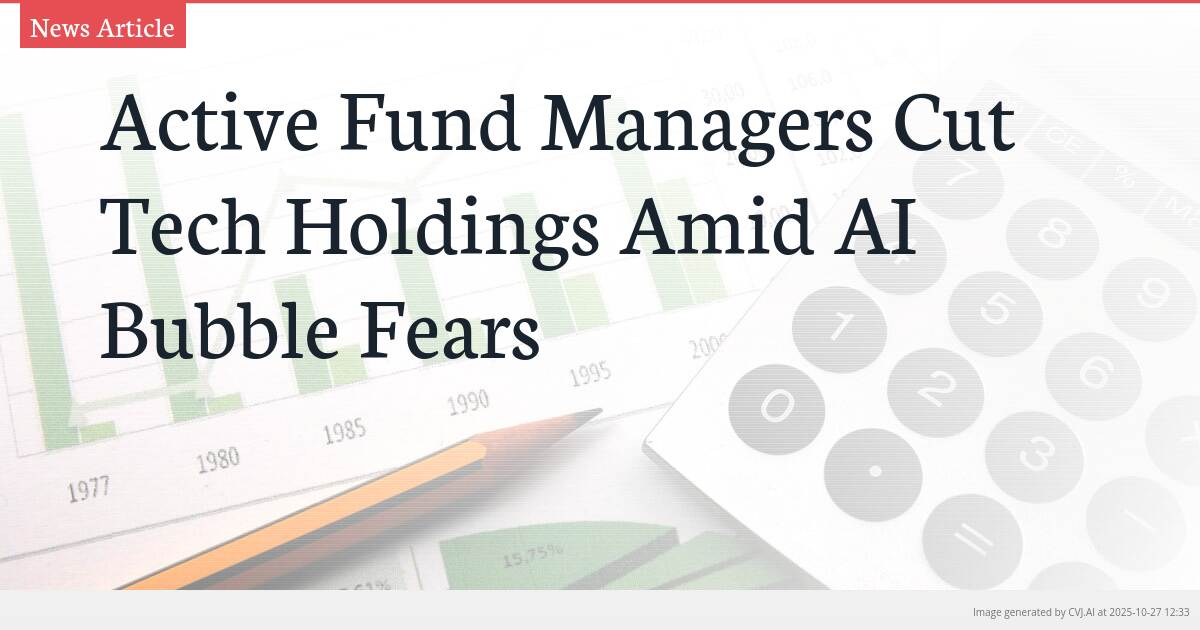This summary text is fully AI-generated and may therefore contain errors or be incomplete.
Introduction
Active fund managers are dramatically reducing their exposure to technology giants amid growing concerns about an AI-driven market bubble. New data reveals they’ve cut tech holdings to their lowest relative level in five years compared to the S&P 500. This defensive positioning reflects Wall Street’s mounting anxiety about stretched valuations in the artificial intelligence sector.
Key Points
- Tech exposure reduced to 30%, 5 percentage points below S&P 500 weight
- Nvidia, Apple, and Broadcom specifically targeted for position reductions
- Largest relative underweight position in technology stocks in five years
The Great Tech Retreat
Active stock pickers across Wall Street have taken dramatic steps to reduce their exposure to technology high-flyers, responding to mounting warnings about an artificial intelligence bubble. According to data compiled by Seaport Research Partners, mutual fund managers have been systematically paring back holdings of market leaders Nvidia Corp., Apple Inc., and Broadcom Inc. over the past three months. This collective retreat marks a significant shift in strategy for active managers who have traditionally sought to outperform benchmarks through concentrated positions in leading growth stocks.
The scale of this pullback is substantial, with technology exposure among active fund managers falling to just 30% of their portfolios. This represents nearly a 5 percentage point underweight compared to the technology sector’s weighting in the S&P 500 Index. The current positioning reflects the most significant relative underweight in technology stocks that active managers have maintained in five years, indicating deep-seated concerns about valuation sustainability despite the sector’s unprecedented grip on broader market performance.
Bubble-Phobia Grips Wall Street
The defensive positioning by active fund managers reveals a growing case of what market observers might call ‘bubble-phobia’ – a cautious approach driven by fears that current AI-driven valuations may not be sustainable. This sentiment has spread through Wall Street trading desks and investment committees, with managers choosing to reduce exposure to some of the market’s best-performing names rather than risk being caught in a potential downturn. The move represents a fundamental disagreement with the market’s current composition, where technology stocks have maintained dominant influence.
The specific targeting of Nvidia, Apple, and Broadcom for position reductions is particularly telling, as these companies have been at the forefront of the AI revolution and market leadership. Nvidia’s graphics processing units power many AI applications, Apple has integrated AI across its product ecosystem, and Broadcom provides critical semiconductor solutions for AI infrastructure. The decision by active managers to reduce exposure to these market darlings suggests they believe the AI narrative may be fully priced into current valuations, leaving limited upside potential.
Performance Implications and Market Impact
This significant underweight position in technology stocks carries substantial implications for fund performance and alpha generation. By maintaining a 5 percentage point underweight relative to the S&P 500’s technology weighting, active managers are making a bold bet against continued tech sector outperformance. This positioning could either prove prescient if technology stocks correct or costly if the AI-driven rally continues. The data from Seaport Research Partners highlights the tension between chasing performance and managing risk in a sector that has dominated market returns.
The collective action by mutual fund managers represents one of the most pronounced sector bets against the market’s composition in recent years. With technology exposure at its lowest relative level in five years, active managers are essentially betting that the AI bubble fears will materialize into actual market corrections. This defensive stance comes despite technology’s continued strong fundamentals and innovation pipeline, suggesting that valuation concerns have overtaken growth prospects in managers’ decision-making frameworks.
The United States equity market now faces a critical test as professional money managers position themselves defensively against the very sector that has driven recent market gains. The divergence between active managers’ cautious positioning and the S&P 500’s heavy technology weighting sets up a potential performance showdown that will determine whether bubble fears were justified or whether managers missed out on continued tech leadership.
📎 Read the original article on bloomberg.com

